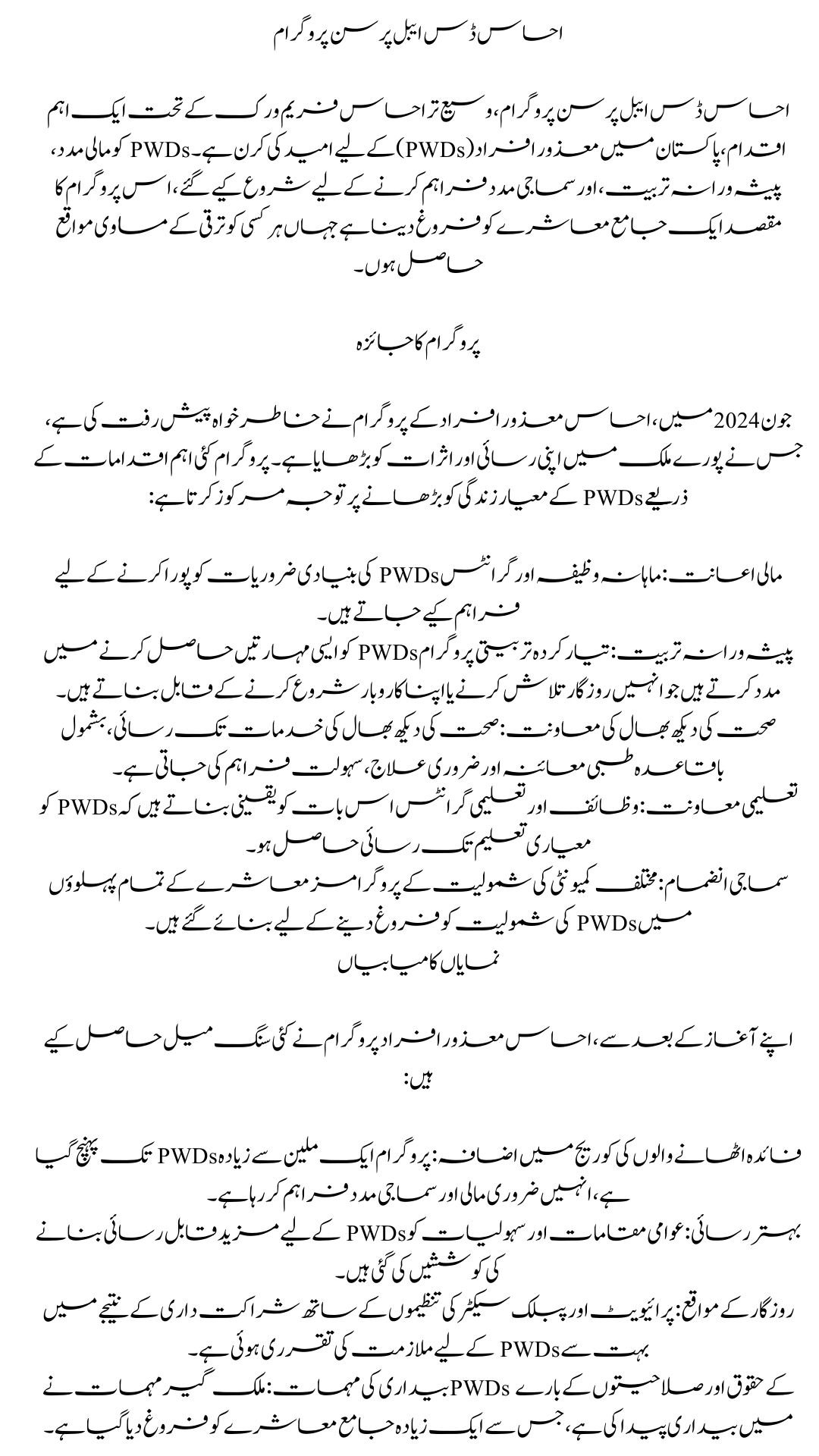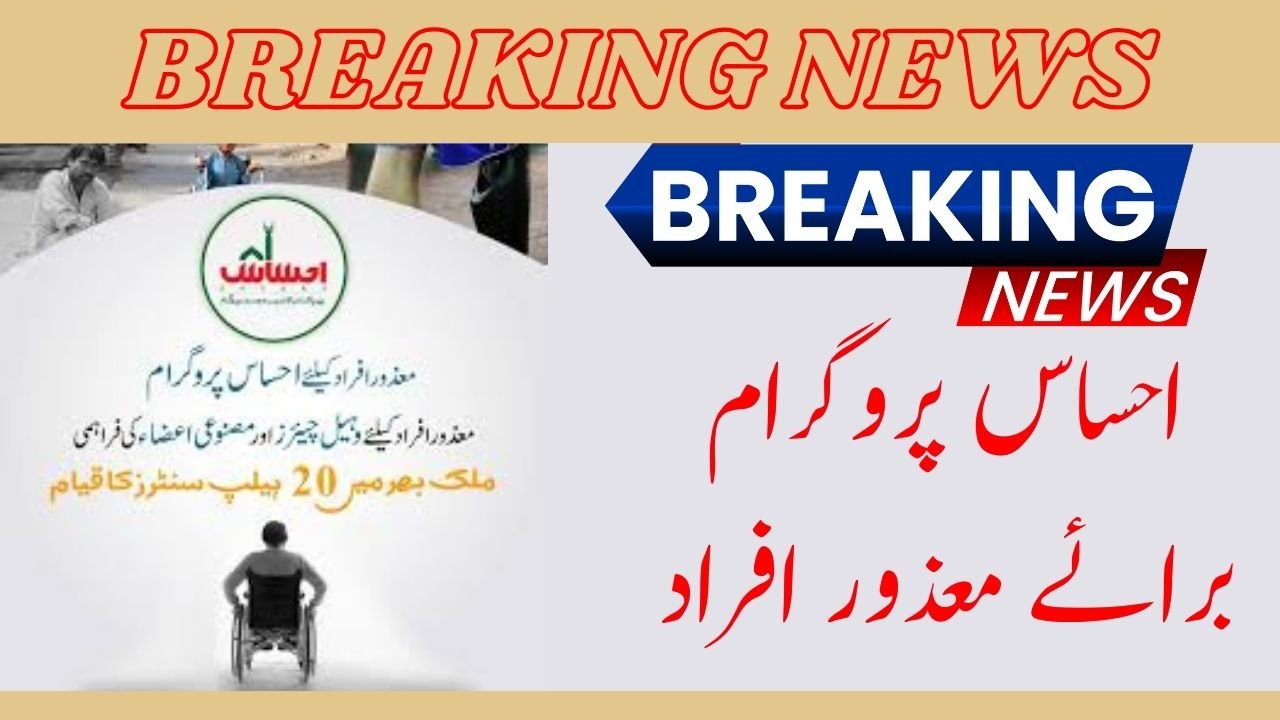Ehsaas Disable Person Program
The Ehsaas Disable Person Program, a significant initiative under the broader Ehsaas framework, has been a beacon of hope for persons with disabilities (PWDs) in Pakistan. Launched to provide financial assistance, vocational training, and social support to PWDs, this program aims to foster an inclusive society where everyone has equal opportunities to thrive.
Overview of the Program
In June 2024, the Ehsaas Disable Person Program has made substantial progress, extending its reach and impact across the country. The program focuses on enhancing the quality of life for PWDs through several key initiatives:
- Financial Assistance: Monthly stipends and grants are provided to support the basic needs of PWDs.
- Vocational Training: Tailored training programs help PWDs acquire skills that enable them to find employment or start their own businesses.
- Healthcare Support: Access to healthcare services, including regular medical check-ups and necessary treatments, is facilitated.
- Educational Support: Scholarships and educational grants ensure that PWDs have access to quality education.
- Social Integration: Various community engagement programs are designed to promote the inclusion of PWDs in all aspects of society.
Key Achievements
Since its inception, the Ehsaas Disable Person Program has achieved several milestones:
- Increased Beneficiary Coverage: The program has reached over a million PWDs, providing them with the necessary financial and social support.
- Enhanced Accessibility: Efforts have been made to make public spaces and facilities more accessible to PWDs.
- Employment Opportunities: Partnerships with private and public sector organizations have resulted in job placements for many PWDs.
- Awareness Campaigns: Nationwide campaigns have raised awareness about the rights and capabilities of PWDs, fostering a more inclusive society.

FAQs about the Ehsaas Disable Person Program
Q1: What is the Ehsaas Disable Person Program?
A1: The Ehsaas Disable Person Program is an initiative under Pakistan’s Ehsaas framework designed to support persons with disabilities (PWDs). The program offers financial assistance, vocational training, healthcare support, educational opportunities, and social integration initiatives to enhance the quality of life for PWDs.
Q2: Who is eligible for the program?
A2: The program is open to all Pakistani citizens with documented disabilities. Eligibility is determined through a registration and verification process conducted by the Ehsaas program authorities.
Q3: How can one register for the program?
A3: Individuals can register for the program by visiting the nearest Ehsaas registration center or through the official Ehsaas website. Required documentation includes a disability certificate from a recognized medical authority, proof of identity, and proof of residence.
Q4: What types of financial assistance are provided?
A4: The program provides monthly stipends, one-time grants for specific needs, and financial support for starting small businesses. The amount varies depending on the individual’s needs and circumstances.
Q5: What kind of vocational training is available?
A5: Vocational training programs cover a wide range of skills, including computer literacy, handicrafts, tailoring, and more. The training is designed to help PWDs gain employment or become self-employed.
Q6: How does the program support educational needs?
A6: The program offers scholarships and educational grants to PWDs pursuing primary, secondary, or higher education. Additionally, support is provided for special education institutions catering to the needs of PWDs.
Q7: What healthcare services are included?
A7: Beneficiaries have access to regular medical check-ups, essential treatments, and specialized healthcare services. The program also covers the cost of assistive devices like wheelchairs and hearing aids.
Q8: How does the program promote social integration?
A8: The program runs various community engagement activities, awareness campaigns, and partnerships with organizations to promote the inclusion of PWDs in social, cultural, and economic activities.
Q9: Are there any success stories from the program?
A9: Yes, there are numerous success stories. For instance, many PWDs have successfully completed vocational training and secured employment. Others have started their own businesses with the financial assistance provided by the program.
Q10: How is the program funded?
A10: The program is funded by the Government of Pakistan, with additional support from international organizations, NGOs, and private sector partnerships.
Q11: What is the impact of the program on the lives of PWDs?
A11: The program has significantly improved the lives of PWDs by providing them with financial stability, access to education and healthcare, and opportunities for social and economic inclusion. Beneficiaries report higher self-esteem, better health outcomes, and improved quality of life.
Q12: How can the public support the program?
A12: The public can support the program through donations, volunteering, and by spreading awareness about the rights and capabilities of PWDs. Additionally, businesses can partner with the program to create more inclusive employment opportunities.
Q13: What are the future plans for the program?
A13: The program plans to expand its reach to cover more PWDs, introduce new training modules, and enhance its healthcare and educational support services. There are also plans to collaborate with more organizations to create a more inclusive society.
Q14: How does the program ensure transparency and accountability?
A14: The program ensures transparency and accountability through regular audits, beneficiary feedback mechanisms, and by publishing annual reports detailing its activities and achievements.
Q15: Can beneficiaries provide feedback on the program?
A15: Yes, beneficiaries are encouraged to provide feedback through various channels, including the official Ehsaas website, feedback forms at registration centers, and through dedicated helplines.
Conclusion
The Ehsaas Disable Person Program is a testament to the commitment of the Government of Pakistan to create an inclusive society where every individual, regardless of their physical or mental abilities, can lead a dignified and fulfilling life. By providing comprehensive support in various aspects of life, the program not only alleviates the challenges faced by PWDs but also empowers them to contribute positively to society. The success of the program lies in its holistic approach, addressing financial, educational, healthcare, and social needs, thereby fostering a more inclusive and equitable community
